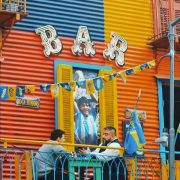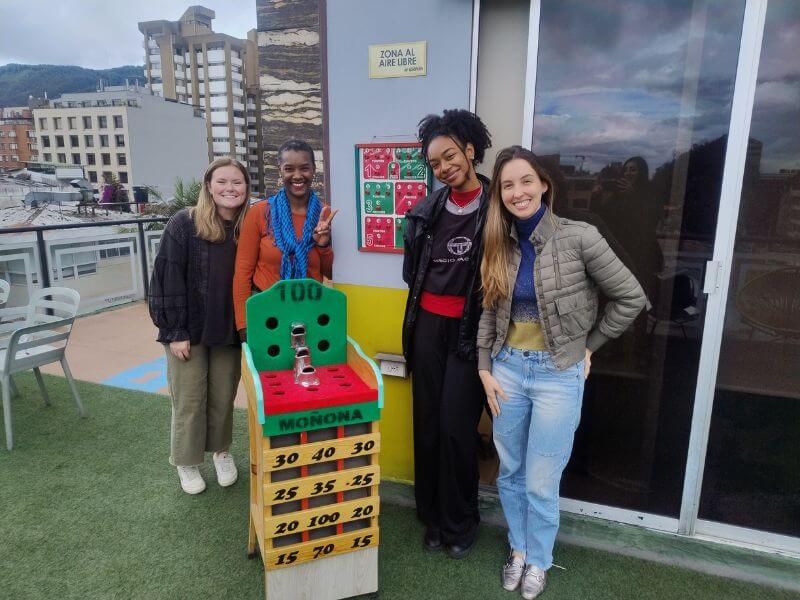20 words that only make sense in Colombia
What’s the first thing that comes to your mind when you hear about Colombia?
Colombia is known for its coffee, emeralds, and salsa music. It is also known for its beautiful landscapes, biodiversity, and variety of fruits.
And, of course, Colombia is known for its people and its language!
Colombian people are one of the reasons why people visit our country. Also, one of the reasons why people want to learn Spanish, Colombian Spanish.
Have you heard of Gabriel Garcia Marquez, Fernando Botero and Nairo Quintana?
Or, James Rodriguez, Falcao, Mariana Pajon, and Shakira?
Or, Carlos Vives, and Sofia Vergara?
We bet you have!
Wouldn’t it be great to read their books or listen to their songs and interviews in the original language? Wouldn’t it be great to understand what they say, even when they use slang or Colombian expressions?
Also, when traveling around the country, nothing better than connecting with the people by talking to them in their native language, right?
Why is it also important to learn Colombian Spanish?
After Mexico, Colombia is the country with the most native Spanish speakers worldwide, and it even surpasses Spain, where the Spanish language originated.
This only means that learning Colombian Spanish is not only fun, but it is also handy!
We are a lot of people, and we love to talk and travel around the world. So, you will always meet Colombians around.
Before starting…
What’s Colombian Spanish?
Colombian Spanish is a group of Spanish language dialects spoken in Colombia.
Since the dialects spoken in the various regions of Colombia are quite diverse, this term is of more geographical than linguistic relevance. When referring to “Colombian Spanish,” people commonly refer to the standard dialect spoken in Bogotá.
This dialect is generally known for being the clearest Spanish to understand and the easiest Spanish to learn.
It doesn’t mean Colombian Spanish is a different language. Once you learn any variation of Spanish, you will be able to communicate with any native Spanish speaker. Regardless of their nationality.
The difference lies in the accents, slang and popular expressions.
That is why we are writing this article!
Unique Colombian words
Some expressions only exist in Colombia. Words you think you know, but, in Colombia, the meaning might be different.
Let’s see!
Parche
Dictionaries will tell you it means “patch,” but in Colombia it means:
- A group of friends getting together to do something.
- Sometimes it could mean “something super cool”. For that, you can use the expression “Qué parche!”
But, if you don’t have anything to do, or you’re bored, you can say: “Qué desparche!” or “Estoy Desparchado”
Cantaleta
“Cantaleta” is a frequent repetition of a topic or subject until it annoys the listener. It is similar to nagging.
This word is normally used when your parents or partner is annoying you with the same discussion.
We would say in Colombian Spanish:
Ay mamá, usted si da cantaleta (“Mom, you really know how to nag!”)
¡Ya! ¡Deja la cantaleta! (OK, enough… stop nagging!)
Amañado
When you come to Colombia, this is a word you will hear a lot.
People will ask you if you like Colombia and if you are “amañado/a” in the country.
“Amañado” is an adjective used to refer to the adaptation to or enjoyment of a new place or situation.
So, when people ask
Estás amañado/a en Colombia?
They want to know if you feel happy, if you are well adapted, and if you are enjoying your stay in the country.
Intenso/Intensa
On the one hand, this word means “intense” or “deep.”
For example:
Una conversación intensa means “A deep/intense conversation”
Yet, when you hear this word referring to a person… “Ella es muy intensa” or “Él es muy intenso”, the meaning is a bit different. It means the person is very, very persistent, to the point they get annoying.
For example:
Ese man es super intenso, no deja de llamarme
(That guy is so annoying, he doesn’t stop calling me)Mi novia es super intensa, quiere que estemos juntos todo el tiempo
(My girlfriend is a bit overwhelming, she wants us to be together all the time)
Pecueca
This is a unique Colombian word, and it describes the bad smell of someone’s feet or shoes.
¡Eww, Huele horrible… huele a pecueca!
(Eww, it smells horrible… like the smell of stinky feet!
Chucha
As we have a word for the bad smell of someone’s feet or shoes, we have a specific word for the bad smell of someone’s armpits.
In Colombian Spanish, for the bad smell that comes from the armpits due to sweat, we say “chucha”.
Manejar
Usually, this word means “To handle”. For example:
¿Estás preparado para manejar esta situación?
Are you ready to handle this situation?
However, in Colombia we use “manejar” as a synonym of the verb “conducir” (to drive).
Lo siento, no te pude contestar porque iba manejando.
(I’m sorry, I couldn’t get your call cause I was driving)
Abrirse
This is a variation of the verb “Abrir” (To open).
“Abrirse” is a very informal word, and you shouldn’t use it at work or family gatherings. It might sound ordinary and rude.
How could you use it? For example, when at a party people is getting too drunk, you could say:
Ya la gente está muy borracha, yo me abro de aquí!
People are already too drunk, and I would rather leave!¡Ábrete de acá!
Leave now!
Chiste
This one is simple; it means “joke.”
The common translation of “joke” into Spanish is “broma.” If you say “broma” in Colombia, we will understand, but we use the word “chiste” instead.
Mecato
This is a very popular noun we use for “snack”. It’s that treat you eat between meals.
Another popular Colombian word for “snack” is “Onces”. We always use this noun in plural.
The difference between mecato and onces is:
- The first one, “mecato,” refers to any snack during the day (i.e., cookies, chocolate, chips, etc.)
- The second one, “onces” refers to something more elaborated. It’s a snack between breakfast and lunch or between lunch and dinner, like elevenses or afternoon tea.
Necio/Necia
It’s a colloquial noun that refers to someone that can’t stay still, who’s misbehaving and irritating. It’s more often used to refer to spoiled kids.
On the contrary, when someone is well behaved, we use the word “juicioso”. In this case, this word is also used for adults when they want to say they have been mostly home, studying or working.
Traga
You might think this word comes from the verb “tragar”, which means “to swallow”.
But, no, it has a different meaning. It refers to the person for whom you have a crush. So, your “traga” is “your crush”
Esa traga suya lo tiene loco (Your crush on that girl is driving you crazy)
Estoy tragada de ese chico (I have a crush on that guy)
Avión
This might sound easy and obvious… But we are sorry to say that “avión” doesn’t always mean “Airplane”.
In Colombian Spanish, when we refer to someone as “avión”, we mean that the person is bold, smart and audacious.
However, it is not always a positive attribute. People that are “avión” usually take advantage of any situation, or advantage of other people.
Camello
This case is similar to the previous one.
When you refer to the animal, yes, “Camello” is that animal that lives in the desert.
But, in Colombian Spanish, we also use “camello” referring to “a job/work”
No, hoy no puedo ir, tengo mucho camello.
(No, I can’t go today, I have so much work to do.Hola ¿Cómo va todo? ¿Mucho camello estos días?
(Hi, how is it going? Too much work these days?)
In Colombian Spanish, we sometimes make up verbs out of nouns. Thus:
“Camellar” means trabajar
No, hoy no puedo ir, tengo que camellar.
(No, I can’t go today, I gotta work.)
Chepa
This is a popular and colloquial Colombian word that means “luck”
We also say “suerte” (literal translation of luck) but as slang we would use “chepa”
For example:
Pasé el examen de pura chepa
(I passed the test by pure luck)Metió el gol de pura chepa
(He scored by pure luck)
Alternative slang words for “chepa” are: “chiripa” or “arepa”. You can use them in the same exact way.
Chiviado
It’s an adjective for something fake, an imitation of a renowned brand, or something of low quality.
Este reloj que me compré me salió chiviado
(This watch I just bought turned to be fake)
Cuchibarbie
It refers to an elderly lady who is reluctant to accept the passage of time. She undergoes all sorts of surgeries to look much younger than she is.
Motoso
Motoso is another word we use for “siesta” (nap)
In Colombian Spanish we would say
Me voy a echar un motoso
(I’m going to take a nap)
Vitrinear
This is another example of how we turn nouns into verbs.
“Vitrina” is a “shop window”.
In Colombian Spanish, we use this verb when walking around a mall, looking at the shops without buying anything.
That verb is “vitrinear,” something like window-shopping
Trancón
In many other Spanish-speaking countries, “traffic jam” is “embotellamiento”.
In Colombian Spanish, we don’t use those words, we use “trancón”
No pude llegar antes, lo siento… ¡Había un trancón tenaz!
(Sorry, I couldn’t arrive earlier… There was a horrible traffic jam!)
As a funny fact, in Colombia we use this word to joke with friends. When someone is late to a date/gathering, and blames the traffic.
For example
Lo siento, llegué super tarde, pero es que había un trancón impresionante!
(Sorry guys, I’m super late but there was a terrible traffic jam!
Friends might reply:
Si, cómo no …! ¡Dirá más bien un trancón de cervezas!
(Yes, sure… You mean beer traffic jam, don’t you?
We hope we have enjoyed reading this article! Practice these unique Colombian words with friends. We guarantee you will have quite a few laughs!
If you want to learn or improve your Spanish, join our classes in-person or online! We will tailor a learning program specifically for you.
Also, read more articles on our blog and follow us on our social media Facebook | Instagram | Linkedin












